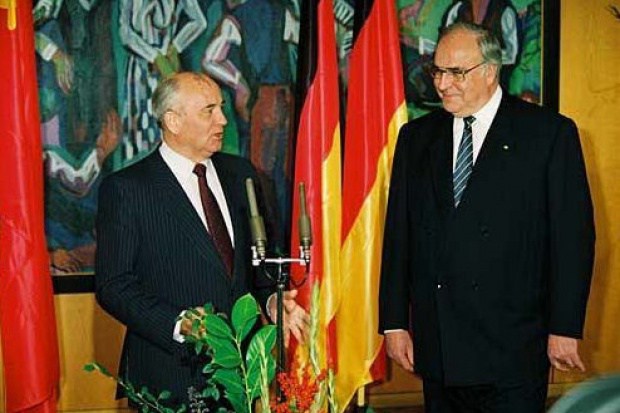By David Swanson
For decades the pretense has been maintained that there is some doubt as to whether the United States really promised Soviet leader Mikhail Gorbachev that if Germany reunited, then NATO would not expand eastward. The National Security Archive has put such doubts to rest at least until the de-neutering of the internet succeeds.
On January 31, 1990, West German Foreign Minister Hans-Dietrich Genscher made a major public speech in which, according to the U.S. Embassy in Bonn, he made clear “that the changes in Eastern Europe and the German unification process must not lead to an ‘impairment of Soviet security interests.’ Therefore, NATO should rule out an ‘expansion of its territory towards the east, i.e. moving it closer to the Soviet borders.’”
On February 10, 1990, Gorbachev met in Moscow with West German leader Helmut Kohl and gave Soviet assent, in principle, to German unification in NATO, as long as NATO did not expand to the east.
U.S. Secretary of State James Baker said that NATO would not expand eastward when he met with Soviet Foreign Minister Eduard Shevardnadze on February 9, 1990, and when he met with Gorbachev the same day. Baker told Gorbachev three times that NATO would not expand one inch eastward. Baker agreed with Gorbachev’s statement that “NATO expansion is unacceptable.” Baker told Gorbachev that “if the United States keeps its presence in Germany within the framework of NATO, not an inch of NATO’s present military jurisdiction will spread in an eastern direction.”
People like to say that Gorbachev should have gotten this in writing.
He did, in the form of the transcript of this meeting.
Baker wrote to Helmut Kohl who would meet with Gorbachev the next day, February 10, 1990: “And then I put the following question to him. Would you prefer to see a united Germany outside of NATO, independent and with no U.S. forces or would you prefer a unified Germany to be tied to NATO, with assurances that NATO’s jurisdiction would not shift one inch eastward from its present position? He answered that the Soviet leadership was giving real thought to all such options [….] He then added, ‘Certainly any extension of the zone of NATO would be unacceptable.’” Baker added in parentheses, for Kohl’s benefit, “By implication, NATO in its current zone might be acceptable.”
Kohl told Gorbachev on February 10, 1990: “We believe that NATO should not expand the sphere of its activity.”
NATO secretary-general Manfred Woerner, in July 1991, told Supreme Soviet deputies “that the NATO Council and he are against the expansion of NATO.”
The message seems to have been consistent and repetitive and completely dishonest. Gorbachev should have gotten it in marble 100-feet high. Maybe that would have worked.






